Alma Mater Europaea
Alma Mater Europaea (Latin for "The European nourishing mother", i.e. university) is an international university based in the Austrian city of Salzburg, with campuses in several European cities. It was founded as an initiative by the European Academy of Sciences and Arts, a learned society of around 2100 prominent scientists, including 31 Nobel laureates.[1]
University | |
 | |
| Latin: Alma Mater Europaea | |
| Motto | European University for Leadership |
|---|---|
| Established | 2010 |
| President | Felix Unger |
| Rector | Werner Weidenfeld |
Academic staff | 260 |
| Students | 1300 |
| Undergraduates | 900 |
| Postgraduates | 300 |
| 100 | |
| Location | , |
| Campus | campuses in Switzerland, Germany, Slovenia, Italy, Kosovo, Croatia |
| Colors | Blue, Yellow |
| Nickname | Alma Mater, AlmaMater, Almamater |
| Affiliations | European Academy of Sciences and Arts |
| Website | www.almamater.eu www.almamater.si www.ameu-eca.eu www.almamater.hr |
Among the leading scholars, who teach or have given guest lectures at Alma Mater or its events, are Harvard Law School professor Mark Tushnet, Oxford professor Jacob Rowbottom, German political scientist Werner Weidenfeld, who is also the rector of Alma Mater, the Alma Mater president and cardiac surgeon Felix Unger, the Facebook and Instagram Oversight Board member and former European Court of Human Rights vice-president Andras Sajo, David Erdos of Cambridge, the Slovenian Constitutional Court judge Klemen Jaklic, who had lectured at Harvard for seven years before joining Alma Mater, and philosophers Alain Badiou, Jean-Luc Nancy, and Srećko Horvat.[2][3][4] Alma Mater faculty has participated at the leading universities' events including those of Harvard, UCLA, and Yale.[5][6][7] Their expert opinion appeared in leading media such as The Guardian, The Boston Globe, and Euractiv.[8][9][10][11]
History

Since the early 2000s, the European Academy of Sciences and Arts has been planning the establishment of the university, occasionally with the subtitle of European University for Leadership.[12][13][14]
In 2010, Alma Mater Europaea was officially established, with leading Austrian surgeon Felix Unger being appointed as its first president, while the German political scientist Werner Weidenfeld became the first rector, and the Slovenian lawyer, university administrator and diplomat Ludvik Toplak the first prorector.
At a meeting in Munich in February 2011, under the patronage of the presidents of 12 member states of the European Union, the board determined which courses the university would provide. These were to be taught in various cities across the union, in several languages, including English, German, and Spanish.[15] In line with the international nature of the university, students, teachers, and prominent European thinkers would meet at an international symposium at the graduation. It was also decided that Alma Mater Europaea would be incorporated in European and international networks of universities through cooperation agreements.[16] At the meeting it was decided that in the first stage, Alma Mater Europaea would start three 2-year master's degree programs.[17] The university board stated that Alma Mater Europaea would be based on three so-called "W principles": Wissenschaft, Wirtschaft, Wirken. In German, this means: Science, Economy, Effect.[18]

In 2011, the university opened in Slovenia its first campus, located in the Slovenian city of Maribor. This campus enrolled about 500 students in 2011. In July 2011 the university also co-sponsored a summer school in St. Gallen, Switzerland.[19] In the academic year 2012–2013, about 800 students were enrolled in Maribor, the campus in Croatian capital Zagreb was opened, and part of the master's degree studies were carried out in Brussels. In 2013, the Salzburg campus of Alma Mater Europaea was founded and about 1000 students were enrolled in various studies in Austria, Slovenia, and other countries in academic year 2013/14. In 2014, two higher education institutions joined Alma Mater Europaea. The first one is Institutum Studiorum Humanitatis (ISH), internationally renown graduate school of philosophy, with which Slavoj Žižek and numerous other world's leading philosophers had been affiliated. ISH was established in 1992. The other one is the Dance Academy, established in 2008. It is one of the few European institutions issuing government accredited degrees in dance arts. Also in 2014 the studies in Zurich started and in 2015 the Zürich campus was officially established.
In 2015 New York based Global Center for Advanced Studies partnered with Alma Mater Europaea to start new masters and PhD degrees in humanities. In 2016 two new campuses were opened in Italy and Kosovo, respectively, in the cities of Ascoli Piceno and in the capital Pristina.
Locations and departments
 Alma Mater Europaea headquarters at Sankt Peter Bezirk in Salzburg, Austria
Alma Mater Europaea headquarters at Sankt Peter Bezirk in Salzburg, Austria The campus of Alma Mater Europaea – Evropski center, Maribor in Slovenia. Behind it is the old city hall of Maribor.
The campus of Alma Mater Europaea – Evropski center, Maribor in Slovenia. Behind it is the old city hall of Maribor. Old Meeting Room at the Alma Mater premises in Maribor
Old Meeting Room at the Alma Mater premises in Maribor
Currently, the university has premises in Salzburg, Ljubljana, Maribor, and Murska Sobota. While administration and offices are mainly in Salzburg and Maribor, lecturing takes place mainly in Ljubljana and Murska Sobota. Lecturing in Salzburg, as well as some other European cities, will start in 2014.
- Department of Physical Therapy
- Department of Nursing
- Department of Social Gerontology
- Department of Management and European Studies
- Department of Archival and Documentology Studies
Programmes
- European leadership program, producing future European thinkers; the studies focus in European leadership, culture, political sciences, law, and human rights.
- European business studies, producing future European business leaders; This European MBA program would focus on political leadership and strategies, European identity and political culture, transformation and development of Europe, social reforms, sustainable development, globalization.
- Theological studies, which would be studied at the newly set-up European Dialogue Center for Theological Studies. A network of dialogue between Catholicism, Orthodoxy, and Islam would be formed with a focus on question "What do the others think differently?" [20]
See also
Citations
- "Nobel Prize Laureates – EUROPEAN ACADEMY OF SCIENCES AND ARTS (EASA)". web.archive.org. 2018-06-12. Retrieved 2020-12-06.
- "Iz Maribora vodili okroglo mizo univerze Yale". maribor24.si (in Slovenian). 2020-10-17. Retrieved 2020-10-17.
- "Vsak dan prvi - 24ur.com". www.24ur.com. Retrieved 2020-10-17.
- "Tuji strokovnjaki: Sporočilo o novinarkah prostitutkah in Kučanu zvodniku ni kaznivo #video". siol.net (in Slovenian). Retrieved 2020-10-17.
- "Oxford, Cambridge and Harvard Professors at the Alma Mater Europaea Symposium". www.sloveniatimes.com. Retrieved 2020-10-17.
- "Professor Jurij Toplak at the Yale University roundtable". en.almamater.si. Retrieved 2020-10-17.
- Winkler, Adam (2010-12-01). "Introduction to Lowenstein Festschrift". Election Law Journal: Rules, Politics, and Policy. 9 (4): 261–262. doi:10.1089/elj.2010.9402. ISSN 1533-1296.
- Ronay, Barney (2020-03-05). "Michel Platini's appeal over ban rejected by European court of human rights". The Guardian. ISSN 0261-3077. Retrieved 2020-10-17.
- Toplak, Jurij (2020-09-07). "Voting is every EU citizen's right, regardless of disability". www.euractiv.com. Retrieved 2020-10-17.
- "Push for mail-in vote gaining steam, and scrutiny - The Boston Globe". BostonGlobe.com. May 11, 2020. Retrieved 2020-10-17.
- "Volitve po pošti, če bi jih Šarec dosegel, ne bi bile poštene". siol.net (in Slovenian). Retrieved 2020-10-17.
- Alma Mater Europaea Archived 2013-07-26 at the Wayback Machine der Europäischen Akademie der Wissenschaften und Künste
- EuroAcad → Organisation → Institutes → Alma Mater Europaea
- EuroAcad Archived 2013-01-06 at Archive.today → Search → Alma+Mater
- Alma Mater Europaea Board meeting, Munich, Germany, 18 February 2011 Archived 4 October 2013 at the Wayback Machine
- Alma Mater Europaea Board meeting, Munich, Germany, 18 February 2011 Archived 4 October 2013 at the Wayback Machine
- Alma Mater Europaea Board meeting, Munich, Germany, 18 February 2011 Archived 4 October 2013 at the Wayback Machine
- Alma Mater Europaea Board meeting, Munich, Germany, 18 February 2011 Archived 4 October 2013 at the Wayback Machine
- Summer School Human Change Processes, St. Gallen, Switzerland Archived 2012-04-03 at the Wayback Machine
- Alma Mater Europaea Board meeting, Munich, Germany, 18 February 2011 Archived 4 October 2013 at the Wayback Machine